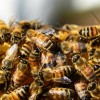Studying Honey Bees with Magnets
Honey bees need their beauty sleep too, according to an interesting study from the University of Texas. Using magnetism, researchers compared the patterns of well-rested honey bees to sleep-deprived ones and found that lack of sleep affects their communication.
In order to study the bees, Dr. Barrett Klein, an animal behaviorist leading the research, created the “insominator”. Klein attached tiny, magnetic pieces of steel to one group of bees and placed them in a glass walled hive. He then put a panel of magnets on the wall, so that they would move and wake up tired bees. Another group of bees served as the control group, or the well-rested insects, with nonmagnetic attachments.
In the honey bee sleep study, researchers found that a social insect, like bees are affected by lack of sleep in a way that is similar to humans. When humans are sleep-deprived their motor skills and ability to perform is affected.
Bees communicate by doing what is called a “waggle” dance. The dance is very precise and strategic in movement. It tells the other bees that the dancing bee has found nectar. But it can also communicate much more, such as: how far away the nectar is, how much nectar there is, and in what direction it can be found. This is all communicated in the way the bee dances. The sleep-deprived bees were less precise in their waggle dance communication than the ones that were well-rested, signalling that lack of sleep affects insects as well as humans.
Klein’s research may be important in the effort to stop the current honey bee population crisis. The U.S. Department of Agriculture (USDA) reported that annual colony losses averaged 33% from 2006-2011. Scientists are exploring a number of different factors that could be causing the colony losses. Parasites, pathogens, environmental factors and management stressors are the main categories that they are focusing on. Although, researchers haven’t pointed to a specific cause for the decline, the study shows that management stressors━in this case, sleep deprivation━does affect bee performance. When bees are moved from one location to another, the bumpy transport likely causes sleep deprivation. However, management stressors are only one factor and more research on the cause of the population decline needs to be conducted.

